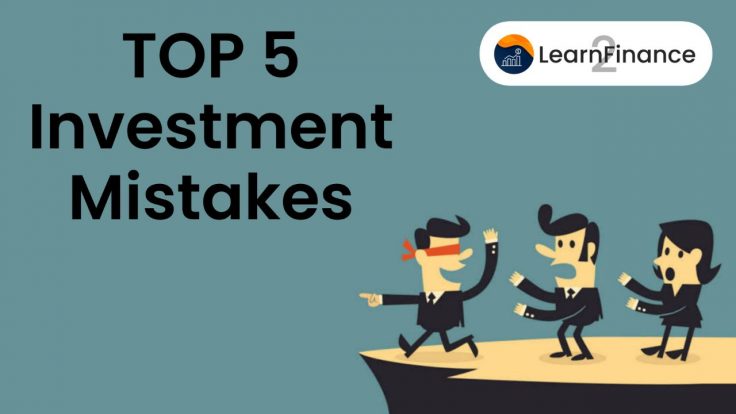Investing is vital, if not essential. You work hard for your money, and it should work hard for you as well.
Not investing, or investing incorrectly, might result in longer working life. However, when done correctly, the returns on your assets may alter everything for you.
It is critical to learn from the best while learning how to invest. However, it is also beneficial to learn from the errors of others.
Here are the top five investment blunders you should avoid at all costs.
1. To start Investing late:
Investing is as simple as beginning at the top of a hill with wet snow and letting a little snowball drift down the slope. The size of the ball is unimportant.
What matters is the height of the hill, i.e. the number of years of compounding ahead of you.
As a result, one of the most common mistakes people make is starting their investing path too late in life.
Investing, like everything else in life, benefits from a head start. Slow and steady wins the race when it comes to investing.
It is preferable to start early and often. When you begin saving early, you give your money more time to grow. You have the luxury of time to take chances.
Furthermore, you benefit from the force of compounding, which means that your investment produces income, and that money earns even more income. As a result, the sooner you begin, the higher your chances of accumulating wealth in the long run.
2. Investing is based on your emotion rather than facts:
There is nothing wrong with soliciting feedback from friends and relatives. But there’s a lot that goes wrong when you mix up ideas with facts.
When you make that mistake, you face the genuine risk of severely sinking your financial ship.
As an investor, it is your responsibility to choose which sources of information should be trusted and have proven a consistent and continuous pattern of insight.
Once you’ve discovered the people or services that may lead to profits, you should only depend on their recommendations to a certain extent, and mix them with your own due diligence and opinions to make investment selections.
Due diligence in investment is what distinguishes successful investors from inexperienced investors.
Thoroughly researching each investment, broker, and money manager before turning over your money may prevent you from catastrophic loss and help you make more lucrative, educated investing selections.
3. Not seeking a margin of safety in valuations and investing on the hype:
Purchasing securities when the market price is considerably below their underlying worth is known as seeking a margin of safety in valuations. This difference allows you to invest with a reduced chance of losing money.
It’s all about the price when it comes to having a safety buffer. It’s made to earn you money by preventing you from losing money.
Warren Buffett is a firm believer in the margin of safety, which he has stated to be one of his investment pillars. As a price target, he has been known to assign as much as a 50% discount to a stock’s underlying value.
So, what happens if you don’t have a safety margin?
You end up paying too much for stocks. You also don’t have any margin for error if your judgement is incorrect. This might add to the many hazards that basic research cannot account for, such as politics, regulatory measures, market movements, and natural calamities.
4. Investing in businesses with a high debt-to-equity ratio:
Companies favour debt over ownership, according to statistics, since debt is more readily available and less expensive.
A firm with too much debt, on the other hand, is not a good investment. This is due to the fact that having too much debt means having to pay interest.
If the economy starts to tank, a firm with a lot of debt will have a hard time repaying its obligations. It will struggle to stay afloat in the event of a downturn.
We’ve all experienced economic downturns, but no one knows when they’ll happen.
As a result, to avoid significant losses in your portfolio, you should always avoid firms that use excessive debt financing.
5. Giving yourself to greed and panic rather than evaluating the basics:
The market is said to be influenced by only two emotions on Wall Street: greed and fear.
Despite the fact that this is an oversimplification, it frequently rings true. Succumbing to these emotions may have a significant negative impact on investor portfolios, the stock market’s stability, and even the whole economy.
When investors are forced to step outside of their comfort zones as a consequence of losses or market volatility, they are sensitive to these emotions, which can lead to expensive blunders.
Stick to the fundamentals and avoid getting caught up with the day’s dominating market mood, which can be influenced by excessive fear or greed.
Conclusion:
To get the most out of your investments, do your homework thoroughly and make educated judgments based on facts rather than gut or emotions.
Select an appropriate asset allocation. Whether you’re considering investing in a firm, take a 360-degree look to determine if it’s a good fit.
It’s also important to keep in mind that investments tied to financial markets might lose value. You may escape the stress of market timing by using a purchase and hold strategy.
Good luck with your investments.



![10 [Must Read] Books on Personal Finance for Indian Investors 3 10 [Must Read] Books on Personal Finance for Indian Investors](https://learn2finance.com/wp-content/uploads/2021/09/10-Must-Read-Books-on-Personal-Finance-for-Indian-Investors-344x194.jpg)




